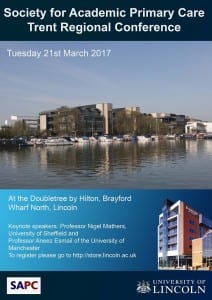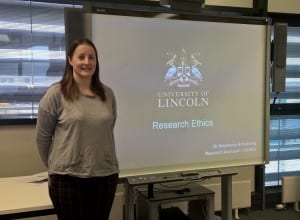 We look forward to welcoming colleagues to the beautiful city of Lincoln for the Trent Regional Spring Conference of the Society for Academic Primary Care. The meeting is being hosted by the University of Lincoln on 21 March 2017 at the Doubletree by Hilton Hotel, Brayford Wharf North, Lincoln LN1 1YW.
We look forward to welcoming colleagues to the beautiful city of Lincoln for the Trent Regional Spring Conference of the Society for Academic Primary Care. The meeting is being hosted by the University of Lincoln on 21 March 2017 at the Doubletree by Hilton Hotel, Brayford Wharf North, Lincoln LN1 1YW.
Abstract submission is now closed and the conference programme will be available to download from the Community and Health Research Unit website www.cahru.org.uk by the end of January.
Our keynote speakers for 2017 are Nigel Mathers, Emeritus Professor of Primary Medical Care and previously Head of the Academic Unit of Primary Medical Care at the University of Sheffield, Aneez Esmail, Professor of General Practice at the University of Manchester and Navjoyt Ladher, a clinical editor at The BMJ.

Nigel Mathers is Professor Emeritus at the University of Sheffield where he was head of the academic unit of primary care until 2016. His research interests have included diabetes prevention, the development of patient decision aids, shared decision making and the evaluation of complex interventions in primary care.
 Aneez Esmail is Professor of General Practice at the University of Manchester and Director of the NIHR Manchester Patient Safety Translational Research Centre. He has published work in several areas of public health including prevention of cot deaths, epidemiology of solvent abuse, preventing paediatric admissions, and the evaluation of telemedicine and patient safety.
Aneez Esmail is Professor of General Practice at the University of Manchester and Director of the NIHR Manchester Patient Safety Translational Research Centre. He has published work in several areas of public health including prevention of cot deaths, epidemiology of solvent abuse, preventing paediatric admissions, and the evaluation of telemedicine and patient safety.
 Navjoyt Ladher is a clinical editor at The BMJ. She heads the scholarly comment section of the journal, is editorial lead for The BMJ Awards, and – her favourite part of the job – is responsible for the BMJ Christmas issue.
Navjoyt Ladher is a clinical editor at The BMJ. She heads the scholarly comment section of the journal, is editorial lead for The BMJ Awards, and – her favourite part of the job – is responsible for the BMJ Christmas issue.
[su_document url=”https://communityandhealth.dev.lincoln.ac.uk/files/2017/01/SAPCConferenceProgramme2017final.pdf” responsive=”no”]Multi-morbidity, goal-oriented care, the community and equity[/su_document]
The venue for the Society of Academic Primary Care Conference is the Doubletree by Lincoln Hotel lincoln.doubletree.com located on Brayford Wharf North, Lincoln, LN1 1YW. The easiest way to travel to the conference is by rail. The Doubletree by Hilton is a short walk from the railway station in Lincoln, the route from the station to the Doubletree by Hilton is shown on the Lincoln City Centre map http://www.lincoln.ac.uk/home/maps/
If you are travelling by coach or minibus then we can arrange a drop off point and parking for the bus on the University Campus. Please e-mail Sue Bowler sbowler@lincoln.ac.uk to arrange this. The nearest car park to the venue is the Lucy Tower car park, Lucy Tower Street, Lincoln, LN1 1XL. The daily parking rate is £7.50. For more information about car parking in Lincoln please see https://www.lincoln.gov.uk/living-in-lincoln/transport-travel-and-parking/parking/car-park-information-prices-postcodes-and-discounts/
If you wish to stay overnight in Lincoln, the Doubletree Hilton will offer a special rate for delegates. Also, the Holiday Inn Express http://www.expresslincoln.co.uk/ is close by and has a University room rate. Please contact Sue Bowler sbowler@lincoln.ac.uk for details. Please book as soon as possible. For alternative accommodation visit the following website: http://www.stayinlincoln.co.uk/
To register please click here. For further information please e-mail sbowler@lincoln.ac.uk.
 The latest CaHRU/LIH Improvement Science and Research Methods seminar was given on 24th January 2017 by Dr. Paul Leighton, Deputy Director at the NIHR Research Design Service for the East Midlands. Paul’s talk, entitled ‘The Delphi technique and other methods of consensus development in applied health settings’, focussed on useful tools for achieving consensus among experts.
The latest CaHRU/LIH Improvement Science and Research Methods seminar was given on 24th January 2017 by Dr. Paul Leighton, Deputy Director at the NIHR Research Design Service for the East Midlands. Paul’s talk, entitled ‘The Delphi technique and other methods of consensus development in applied health settings’, focussed on useful tools for achieving consensus among experts. Paul began the seminar with an overview of the background of consensus methods and gave examples of how such techniques have been used in the past. He then presented the three most commonly used approaches to reaching consensus: the Delphi technique, the nominal group technique, and the consensus conference. He explained the different techniques, discussed issues around using them and conducting consensus events, and finished by comparing the three methods.
Paul began the seminar with an overview of the background of consensus methods and gave examples of how such techniques have been used in the past. He then presented the three most commonly used approaches to reaching consensus: the Delphi technique, the nominal group technique, and the consensus conference. He explained the different techniques, discussed issues around using them and conducting consensus events, and finished by comparing the three methods.










